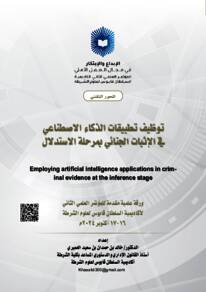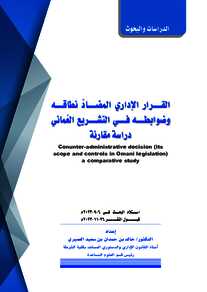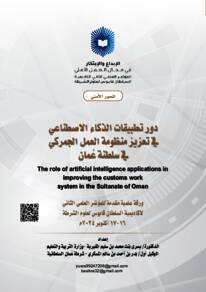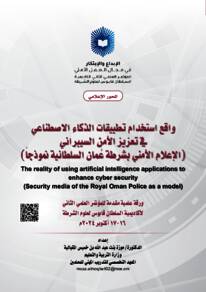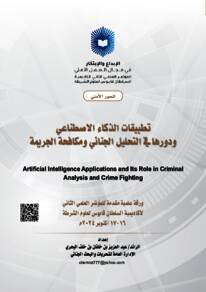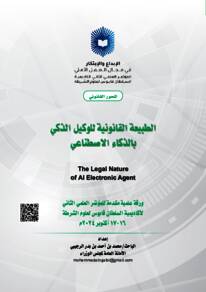Document
توظيف تطبيقات الذكاء الاصطناعي في الإثبات الجنائي بمرحلة الاستدلال.
Source
الأمانة. ع. 44. ص. 1-19.
Contributors
Other titles
Employing artificial intelligence applications in criminal evidence at the inference stage.
Country
عمان.
City
نزوى
Publisher
أكاديمية السلطان قابوس لعلوم الشرطة
Gregorian
2024-10-16
Language
Arabic
English abstract
Artificial intelligence has become an important field in criminal evidence, especially in light of the possibility of criminal gangs exploiting these technologies. It is necessary to exploit artificial intelligence technology for the high-quality information it provides to serve criminal evidence. The problem of the study is around the scope of using artificial intelligence in criminal evidence in the pre-trial phase; and from this arises questions such as: how is artificial intelligence used in predictive policing, to what extent is it used in both collecting evidence and proving flagrante delicto, as well as in biometrics, and emerging forensic sciences, in addition to how to prove the criminal danger of the offender, and finally how to prove cybercrimes by generations of artificial intelligence. This study is based on the applied analytical approach, and aims to explore an important development in the field of criminal justice that contributes to improving the efficiency of criminal evidence processes and providing conclusive evidence that supports justice. The most important results of this study are: AI software is helping police at the street level. It can not only predict crime, but also enable police to prevent it. AI algorithms are used to detect the type of gunshots, and they allow reported burglaries and thefts to be compared and compiled in the police database. The smart crime scene application uses technologies such as crime scene camera and smart translator, allowing judicial officers to electronically document every piece of evidence. Artificial intelligence also offers many computer methods (such as computational intelligence, neural networks, intelligent detective agents, artificial immune systems, machine learning, data mining, pattern recognition, fuzzy logic, inference, etc.) which increasingly play an important role in proving and preventing cybercrime.
Description
المؤتمر العلمي الثاني لأكاديمية السلطان قابوس لعلوم الشرطة (الجزء الثاني): 16-17 أكتوبر، 2024.
ISSN
2412-8317
Hijri
1446
Arabic abstract
لقد أصبح الذكاء الاصطناعي ميداناً مهماً في الإثبات الجنائي لاسيما في ظل إمكانية استغلال تلك التقنيات، ومن الضروري استغلال تكنولوجيا الذكاء الاصطناعي لما تقدمه من معلومات ذات جودة عالية لخدمة الإثبات الجنائي. تدور إشكالية الدراسة حول توظيف تطبيقات الذكاء الاصطناعي في الإثبات الجنائي بمرحلة الاستدلال؛ وينبثق من ذلك تساؤلات فرعية مثل: كيفية استخدامه في الشرطة التنبؤية، وما مدى استخدامه في كلٍ من جمع الاستدلالات وإثبات التلبس بالجريمة، وكذلك في القياسات الحيوية، والعلوم الجنائية المستحدثة، فضلاً عن كيفية إثبات الخطورة الإجرامية للجاني، وأخيراً كيفية إثبات الجرائم السيبرانية بواسطة أجيال الذكاء الاصطناعي. وتعتمد هذه الدراسة على المنهج التحليلي التطبيقي، وتهدف الدراسة لاستكشاف تطور مهم في مجال العدالة الجنائية يساهم في تحسين كفاءة عمليات الإثبات الجنائي وتوفير أدلة دامغة تدعم العدالة. ومن أهم النتائج التي خلصت إليها هذه الدراسة: تفيد برمجيات الذكاء الاصطناعي الشرطة على مستوى الشارع، فهي لا يمكنها التنبؤ فحسب بالجريمة، بل تمكن الشرطة أيضًا من منعها. تستخدم خوارزميات الذكاء الاصطناعي في اكتشاف نوع الطلقات النارية، كما تسمح بمقارنة عمليات السطو والسرقات المبلغ عنها بمئات الآلاف من الجرائم التي تم تسجيلها وتجميعها في قاعدة بيانات الشرطة. كما يستخدم تطبيق مسرح الجريمة الذكي تقنيات مثل كاميرا مسرح الجريمة والمترجم الذكي، ويمكن هذا التطبيق مأمور الضبط القضائي من التدوين والتوثيق الإلكتروني لكل دليل وحرز تم العثور عليه، ويقدم الذكاء الاصطناعي العديد من أساليب الكمبيوتر (مثل الذكاء الحسابي، الشبكات العصبية، العملاء المحققين الأذكياء، نظم المناعة الصناعية، تعلم الآلة، تعدين البيانات، التعرف على الأنماط، المنطق الغامض، الاستدلال، إلخ) وهو ما لعب بشكل متزايد دوراً هاماً في إثبات الجريمة السيبرانية والوقاية منها.
Category
Journal articles

